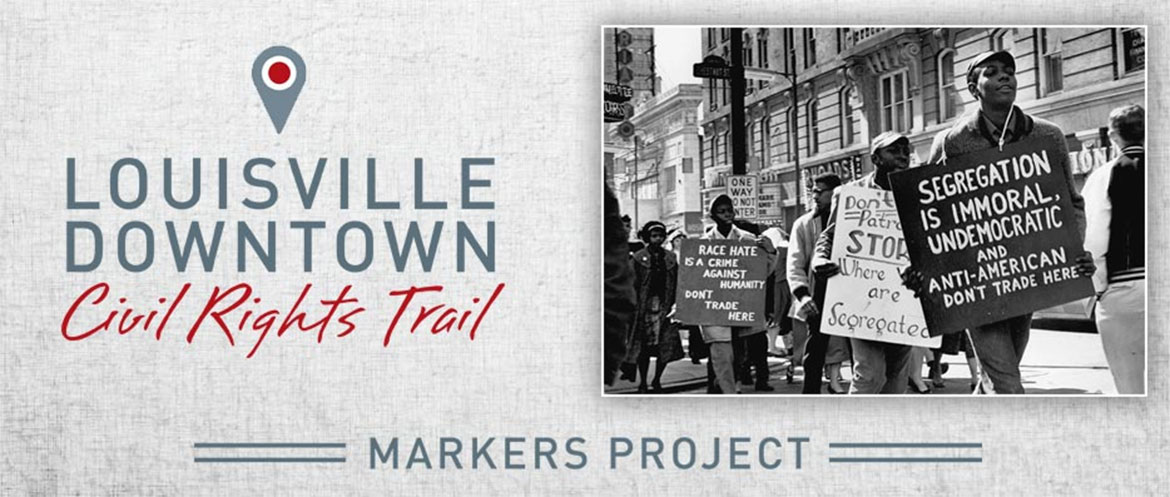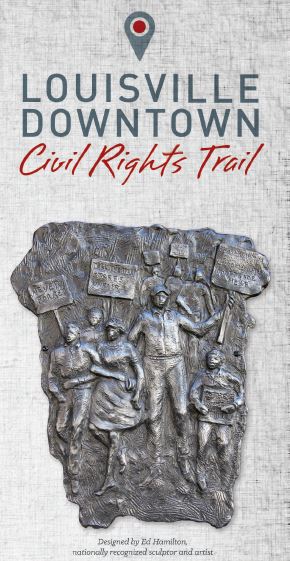Louisville Downtown Civil Rights Trail Markers Project
The Downtown Civil Rights Movement Markers Project was the vision of J. Blaine Hudson, former dean of the University of Louisville College of Arts and Sciences. Dean Hudson’s vision was to preserve the history, heritage and contributions of African Americans to Louisville’s rich history. Fourth Street was Louisville’s primary corridor of restaurants, department stores and theaters. Through the 1950s, most white-owned establishments downtown excluded African Americans or treated them differently as customers—for example, denying them the opportunity to try on clothes, to sit at lunch counters and to enter movie theaters. By winter 1961, small-scale demonstrations and efforts to secure legislation opening all such facilities had failed. The stirrings of protest activity that swept the South in the 1960s inspired African American teenagers who became the “foot soldiers” of the struggle against discrimination in public accommodations in Louisville. Mass student demonstrations in spring 1961, a voter registration drive and a campaign to unseat an unsympathetic mayor and elect a new board of aldermen ultimately led to the passage of the public accommodations ordinance – the first such law in the South. Today, many businesses that were picketed in the demonstrations have closed, relocated or been torn down. In the absence of a physical presence, these markers will preserve the history of the civil rights movement and tell the little-known story of one of Louisville’s greatest achievements.
Local Coverage of the September 21, 2015 unveiling
Louisville Downtown Civil Rights Trail: Vision of former Dean J. Blaine Hudson (UofL College of Arts & Sciences)
Civil Rights Trail marks history in downtown Louisville (Wave 3 News)
Sponsors
Our thanks to the marker sponsors, Office of the Dean, College of Arts and Sciences, Louisville Metro Council, Office of the Mayor, LG&E/KU, The Owsley Brown Charitable Trust, The Louisville( KY) Chapter of the Links Inc., Alpha Phi Alpha Fraternity, Inc., Alpha Lambda Chapter,, The Courier Journal, Pan African Studies Department, Commonwealth Center for the Humanities, Kentucky Commission on Human Rights, Louisville Downtown Partnership.
Advisory Committee
- Mervin Aubespin, Co-Author Two Centuries of Black Louisville
- Lindy Casebier, Deputy Secretary Tourism, Arts & Heritage Cabinet
- Raoul Cunningham, President Louisville Branch, NAACP
- Rebecca Matheny, Interim Director Louisville Downtown Partnership
- Dr. Catherine (Cate) Fosl, Associate Professor Anne Braden Institute for Social Justice
- Darnell Farris Louisville Metro Urban Design Services
- Richard Jett, Retired Louisville Metro Planning & Design
- Dr. Tracy K’Meyer, Chairperson Department of History
- Carolyn Miller-Cooper, Executive Director Human Relations Commission
- Deanna Tinsley Civil Rights Demonstrator
- Clark Welch, Louisville Downtown Partnership
- Rita Phillips, Executive Director Kentucky Center for African American Heritage
- Dr. Teresa Rajack-Talley Pan African Studies
- Nefertiti Burton, Associate Dean, College of Arts & Sciences
- Clest Lanier, Project Coordinator, IDOP College of Arts & Sciences
- Dr. J. Blaine Hudson, Chair, Former Dean, College of Arts & Sciences
PROJECT GUIDE
Acknowledgements (1.6mb)
Introduction (1mb)
Historical Overview (1mb)
Civil Rights Trail Map (1mb)
Civic Mindedness (1.3mb)
Economic Decision Making (1.1mb)
Geographic Reasoning (1.1mb)
Historical Thinking (1mb)
Marker Photos (5mb)
Resources (1mb)


